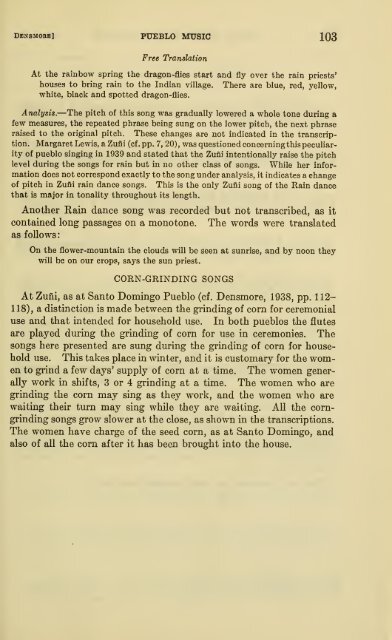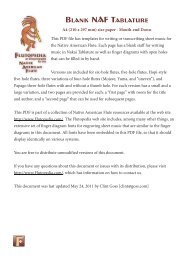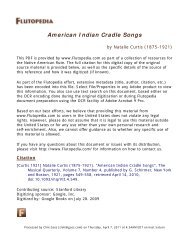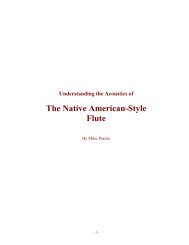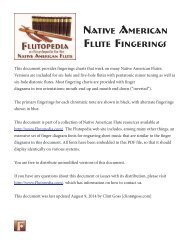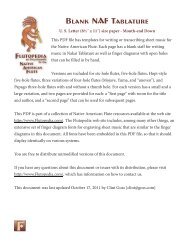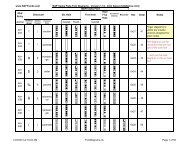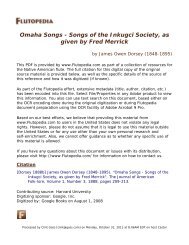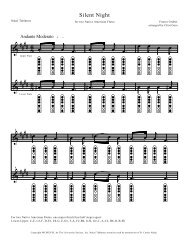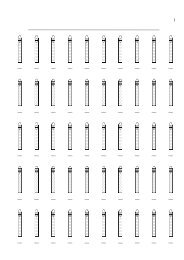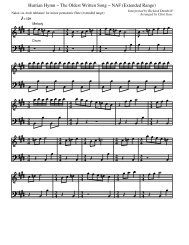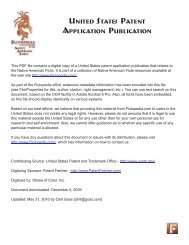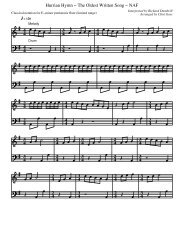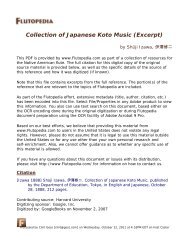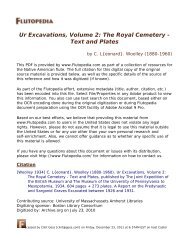Music of Acoma, Isleta, Cochiti, and Zuñi Pueblos - Flutopedia.com
Music of Acoma, Isleta, Cochiti, and Zuñi Pueblos - Flutopedia.com
Music of Acoma, Isleta, Cochiti, and Zuñi Pueblos - Flutopedia.com
Create successful ePaper yourself
Turn your PDF publications into a flip-book with our unique Google optimized e-Paper software.
DENSMOBB] PUEBLO MUSIC 103<br />
Free Translation<br />
At the rainbow spring the dragon-flies start <strong>and</strong> fly over the rain priests'<br />
houses to bring rain to the Indian village. There are blue, red, yellow,<br />
white, black <strong>and</strong> spotted dragon-flies.<br />
Analysis.—The pitch <strong>of</strong> this song was gradually lowered a whole tone during a<br />
few measures, the repeated phrase being sung on the lower pitch, the next phrase<br />
raised to the original pitch. These changes are not indicated in the transcription.<br />
Margaret Lewis, a Zuni (cf. pp. 7, 20), was questioned concerning this peculiarity<br />
<strong>of</strong> pueblo singing in 1939 <strong>and</strong> stated that the Zuni intentionally raise the pitch<br />
level during the songs for rain but in no other class <strong>of</strong> songs. While her information<br />
does not correspond exactly to the song under analysis, it indicates a change<br />
<strong>of</strong> pitch in Zuni rain dance songs. This is the only Zuni song <strong>of</strong> the Rain dance<br />
that is major in tonality throughout its length.<br />
Another Rain dance song was recorded but not transcribed, as it<br />
contained long passages on a monotone. The words were translated<br />
as follows:<br />
On the flower-mountain the clouds will be seen at sunrise, <strong>and</strong> by noon they<br />
will be on our crops, says the sun priest.<br />
CORN-GRINDING SONGS<br />
At Zuni, as at Santo Domingo Pueblo (cf. Densmore, 1938, pp. 112-<br />
118), a distinction is made between the grinding <strong>of</strong> corn for ceremonial<br />
use <strong>and</strong> that intended for household use. In both pueblos the flutes<br />
are played during the grinding <strong>of</strong> corn for use in ceremonies. The<br />
songs here presented are sung during the grinding <strong>of</strong> corn for household<br />
use. This takes place in winter, <strong>and</strong> it is customary for the women<br />
to grind a few days' supply <strong>of</strong> corn at a time.<br />
The women generally<br />
work in shifts, 3 or 4 grinding at a time. The women who are<br />
grinding the corn may sing as they work, <strong>and</strong> the women who are<br />
waiting their tm-n may sing while they are waiting. All the corngrinding<br />
songs grow slower at the close, as shown in the transcriptions.<br />
The women have charge <strong>of</strong> the seed corn, as at Santo Domingo, <strong>and</strong><br />
also <strong>of</strong> all the corn after it has been brought into the house.


